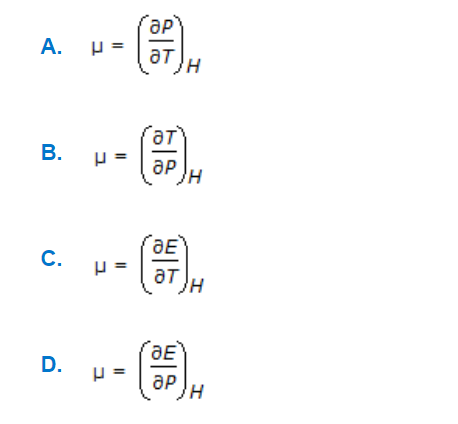Question

a.
A
b.
B
c.
C
d.
D
Posted under Basic Chemical Engineering
Interact with the Community - Share Your Thoughts
Uncertain About the Answer? Seek Clarification Here.
Understand the Explanation? Include it Here.
Q. Joule-Thomson co-efficient is defined as
Similar Questions
Explore Relevant Multiple Choice Questions (MCQs)
Q. To obtain integrated form of Clausius-Clayperon equation given by following equation, from the exact Clayperon equafion, it is assumed that the
View solution
Q. Trouton's ratio is given by (where λb, = molal heat of vaporisation of a substance at its normal boiling point, kcal/kmol Tb = normal boiling point, °K )
View solution
Q. Entropy of an ideal gas depends upon its
View solution
Q. Isobaric process means a constant process.
View solution
Q. No work is done by the system, when a reaction occurs at constant
View solution
Q. If the vapour pressure at two temperatures of a solid phase in equilibrium with its liquid phase are known, then the latent heat of fusion can be calculated by the
View solution
Q. The freezing point of a liquid decreases when the pressure is increased, if the liquid __________ while freezing.
View solution
Q. In a reversible chemical reaction (where, Δx = number of moles of products-number of moles of reactants )
View solution
Q. Out of the following refrigeration cycles, which one has maximum COP ?
View solution
Q. Pick out the correct statement:
View solution
Q. In any spontaneous process,
View solution
Q. Which of the following is a thermodynamic property of a system ?
View solution
Q. The co-efficient of performance (COP) of a refrigerating system, which is its index of performance, is defined as the ratio of useful refrigeration to the net work. The units of __________ and COP are the same.
View solution
Q. In jet refrigerators, the refrigerating fluid is practically always
View solution
Q. Water on heating from 1 to 4°C
View solution
Q. Pick out the correct statement.
View solution
Q. Maximum work that could be secured by expanding the gas over a given pressure range is the __________ work.
View solution
Q. Internal energy change of a system over one complete cycle in a cyclic process is
View solution
Q. Heating of water under atmospheric pressure is an __________ process.
View solution
Q. Van Laar equation deals with the activity co-efficients in
View solution
Recommended Subjects
Are you eager to expand your knowledge beyond Basic Chemical Engineering? We've handpicked a range of related categories that you might find intriguing.
Click on the categories below to discover a wealth of MCQs and enrich your understanding of various subjects. Happy exploring!








